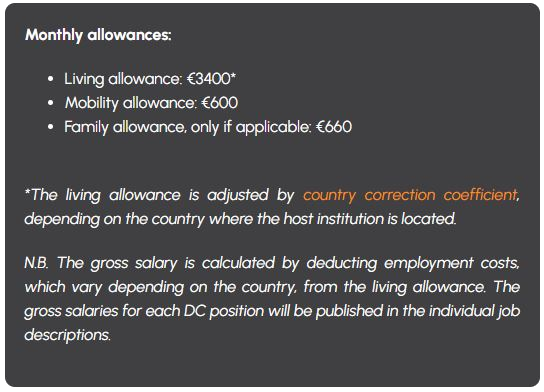Recruitment

Get the complete information about the project objective, organisation of Work Packages and details of each specific job offer available in one single document: Link
Complete information in the Recruitment Fiche (link)
Research Objectives:
(1) To identify thermal and mechanical integration schemes of the Air Separation Unit and Syngas Production fuel Unit (if any) into direct-fired sCO₂ power cycles. (2) To optimise the performance of power systems based on supercritical Carbon Dioxide cycles with direct oxycombustion of gaseous fuels (natural gas and syngas biofuels), including BoP components and potentially carbon capture systems, through the application of Artificial Intelligence algorithms to system integration. (3) To identify the critical technical challenges for the actual implementation of the technology.
Industrial employer
Empresarios Agrupados Internacional
Madrid
Spain
Complete information in the Recruitment Fiche (link)
Research Objectives:
(1) To understand and characterise the roles of different thermal energy sources (renewable and non-renewable) in the transition towards a future carbon-neutral power generation. (2) To identify relevant business cases for the technology and the associated costs of energy in different scenarios. (3) To assess the social and environmental impacts of directly and indirectly heated sCO2 technologies in terms of Life Cycle Assessment and Natural Capital Valuation. (4) To develop a roadmap towards the commercialization of direct sCO₂ systems.
Complete information in the Recruitment Fiche (link)
Research Objectives:
(1) To assess the trade-offs between different integration schemes under largely dissimilar boundary conditions, such as those that are typical of WHR, CSP and nuclear. (2) To optimise the performance of power systems based on indirectly heated supercritical Carbon Dioxide cycles in different applications (WHR, CSP, nuclear), including BoP components, through the application of Artificial Intelligence algorithms to system integration. (3) To identify the critical technical challenges for the actual implementation of the technology.
Industrial employer
Empresarios Agrupados Internacional
Florence
Italy
Complete information in the Recruitment Fiche (link)
Research Objectives:
(1) develop innovative system integration concepts for large-scale energy storage systems relying on sCO₂ power cycles. (2) assess energy storage concepts which could be built around sCO₂ power cycles aiming at providing support to larger shares of variable renewable energies. (3) assess the impact on accelerating the transition towards a future, carbon-neutral energy system. (4) identify the critical challenges for the implementation.
Complete information in the Recruitment Fiche (link)
Research Objectives:
(1) To define the operational strategies of indirect (externally heated) cycles in off-design and high partial loads. (2) To assess the constraints set by the operational strategies on the design specifications of major equipment for each energy source considered: nuclear, WHR, CSP. (3) To define the exceptional operating procedures of indirect sCO₂ power cycles: start-up, shutdown, emergency shutdown (tri: Market up).
Complete information in the Recruitment Fiche (link)
Research Objectives:
(1) define the operational strategies for directly-fired supercritical CO2 power systems. (2) assess the constraints set by the operational strategies on the design specifications of major equipment for each energy source considered. External air separation units – where applicable – will also be taken into consideration. (3) define the exceptional operating procedures of directly-fired supercritical CO₂ power systems: start-up, shutdown, emergency shutdown.
Complete information in the Recruitment Fiche (link)
Research Objectives:
(1) To develop a dynamic model to simulate transient operation of the sCO2 power generation system. (2) To validate the developed dynamic model based on existing experimental data and verified analytical models of components at system level. (3) To evaluate the robustness of sCO2 power systems at the megawatt scale in responding to load variations and emergency trips. (4) To assess the impact of transient operation on the mechanical integrity of critical components.
Complete information in the Recruitment Fiche (link)
Research Objectives:
(1) To develop a tool to simulate the performance of the control system of direct and indirect heating systems. (2) To model the performance of the sCO₂ systems under different control strategies. (3) To develop an optimisation framework for the control system of the sCO₂ power systems. (4) To assess the performance of the optimised control system for critical operation scenarios.
Complete information in the Recruitment Fiche (link)
Research Objectives:
(1) To explore the optimisation of the overall compressor flow path including inlet, impeller, diffuser, volute, and secondary flow paths to maximise performance of the compressor. (2) To validate the different compressor flow path modules numerically and experimentally. (3) To investigate design modifications and operational strategies to enhance part-load control such as inlet guide vanes.
Complete information in the Recruitment Fiche (link)
Research Objectives:
(1) To develop a dynamic model to simulate transient operation of the sCO2 power generation system. (2) To validate the developed dynamic model based on existing experimental data and verified analytical models of components at system level. (3) To evaluate the robustness of sCO2 power systems at the megawatt scale in responding to load variations and emergency trips. (4) To assess the impact of transient operation on the mechanical integrity of critical components.
Industrial secondment
Easy Energy Consulting and Technology
Lamone
Switzerland
Complete information in the Recruitment Fiche (link)
Research Objectives:
(1) To investigate the pseudo-condensation of sCO2. (2) To experimentally investigate the condensation near the pseudo-critical point. (3) To thoroughly assess the data incl. error propagation analysis. (4) To develop a best practice correlation (or look-up table) for designers of heat rejection unit (cooler).
Complete information in the Recruitment Fiche (link)
Research Objectives:
(1) To investigate the mixing of sCO2 flows with different temperature in headers of heat exchangers. (2) To set-up a numerical model for the mixing plena of heat exchanger, e.g. using OpenFOAM. (3) To thoroughly assess the numerical data. (4) To derive recommendation for designers
Complete information in the Recruitment Fiche (link)
Research Objectives:
(1) To understand the mechanisms of degradation of different polymer chemistries (Polyolefin, PTFE, urethanes) in environments simulating sCO2 conditions. (2) To study an innovative system based on the introduction of self-healing polymer ability to minimize mechanical damage and formation of voids and cracks. (3) To select the most corrosion-resistant coatings applied on steel plates for coated parts. (4) To recommend the most suitable polymer matrix for coated components. (5) To investigate metallic alloys and post treatments (including coatings but not limited) for additive manufacturing technologies with corrosion resistance. (6) To understand different quality inspection techniques for nondestructive evaluation of the components. (7) To investigate the applicability of NDTs depending on the type and size of the allowable defect.
Industrial employer
Advanced Center for Aerospace Technologies
Seville
Spain
Complete information in the Recruitment Fiche (link)
Research Objectives:
(1) To study the performance of a high cost nickel alloy (800H) and to compare it with that of stainless steel (316) in supercritical CO2 at temperatures around 650°C. (2) To study the processes of formation of protective corrosion scales and the respective mechanisms; (3) to carry out a comparative corrosion resistance assessment based on electrochemical impedance spectroscopy complemented with microscopic studies. (4) to create a set of guidelines to better select corrosion resistant alloys for sCO2. (5) To investigate the possibilities of additive manufacturing technologies for stainless steel (or other alloys) for HX purposes in sCO2. (6) To investigate design limitations related to different additive manufacturing technologies for the purpose of the HX applications.
Industrial employer
Advanced Center for Aerospace Technologies
Seville
Spain
Complete information in the Recruitment Fiche (link)
Research Objectives:
(1) To evaluate design methodologies and geometry optimization through simulations for enhancing HX applications in sCO2 power systems. (2) To investigate different alloys for its processability through additive manufacturing technologies. (3) To analyse the optimum AM process parameters for desired application. (4) To characterize the material: thermo-mechanical and chemical properties as well as microstructure. (5) To investigate post processing steps, including thermal treatments, surface finishing, weldability, etc. (6) To evaluate the best AM technology for producing the targeted components and geometries through representative samples. (7) Investigate on non destructive evaluation techniques for highly complex geometries validation. (8) To investigate the functional capacity of HX demonstrators with special focus on sCO2 power systems. (9) To derive recommendation for designers and manufacturers.
Industrial employer
Advanced Center for Aerospace Technologies
Seville
Spain
Complete information in the Recruitment Fiche (link)
Research Objectives:
(1) To explore the potential of utilising CO2 mixtures to enhance the performance of indirect sCO₂ power cycles. (2) To identify and characterise dopants according to the temperature level of interest: nuclear, WHR, CSP. (3) To identify optimal cycle layouts for each mixture-application combination. (4) To identify and assess environmental and mechanical integrity – related issues potentially triggered by the working mixtures.
Industrial secondment
Plataforma Solar de Almería (CIEMAT)
Tabernas
Spain
Complete information in the Recruitment Fiche (link)
Research Objectives:
(1) To explore innovative turbine designs aimed at improving the dynamic characteristics of sCO2 turbines. (2) To explore flowpath designs enhancing the turndown capabilities of sCO2 turbines. (3) To explore turbine designs aimed at reducing thermal stress during transients, therefore increasing component lifetime. (4) To produce off-design performance maps for the optimised flow path.
Industrial employer
Siemens Energy
Mülheim an der Ruhr
Germany
